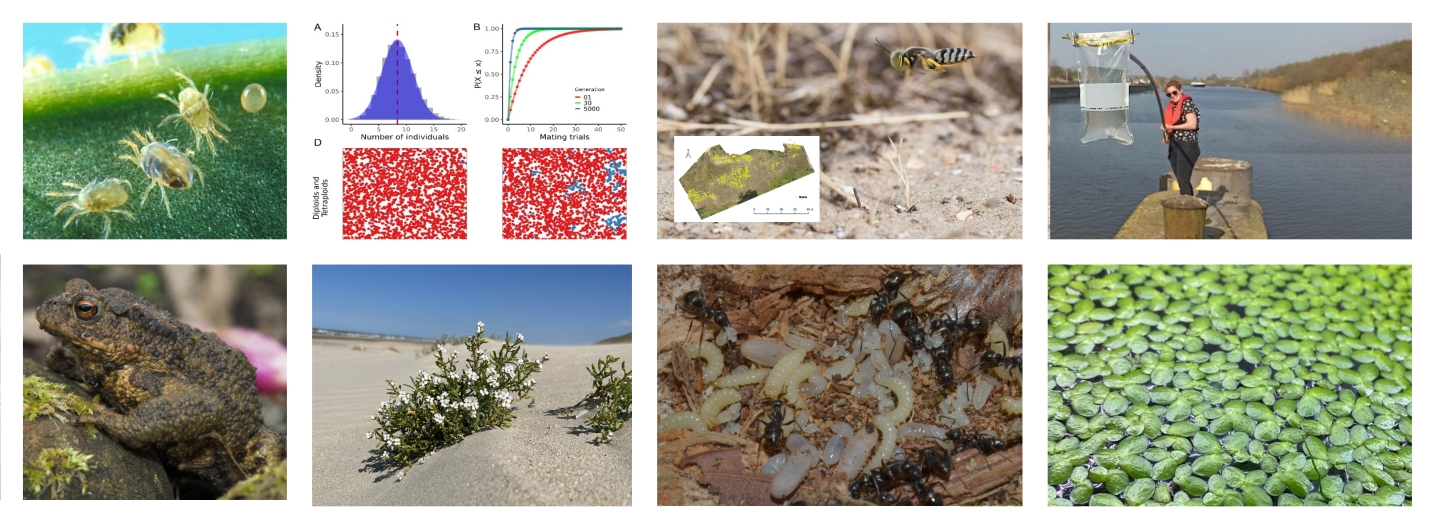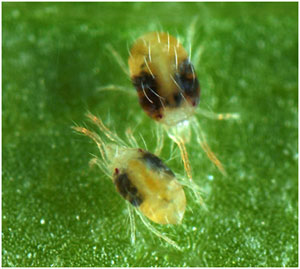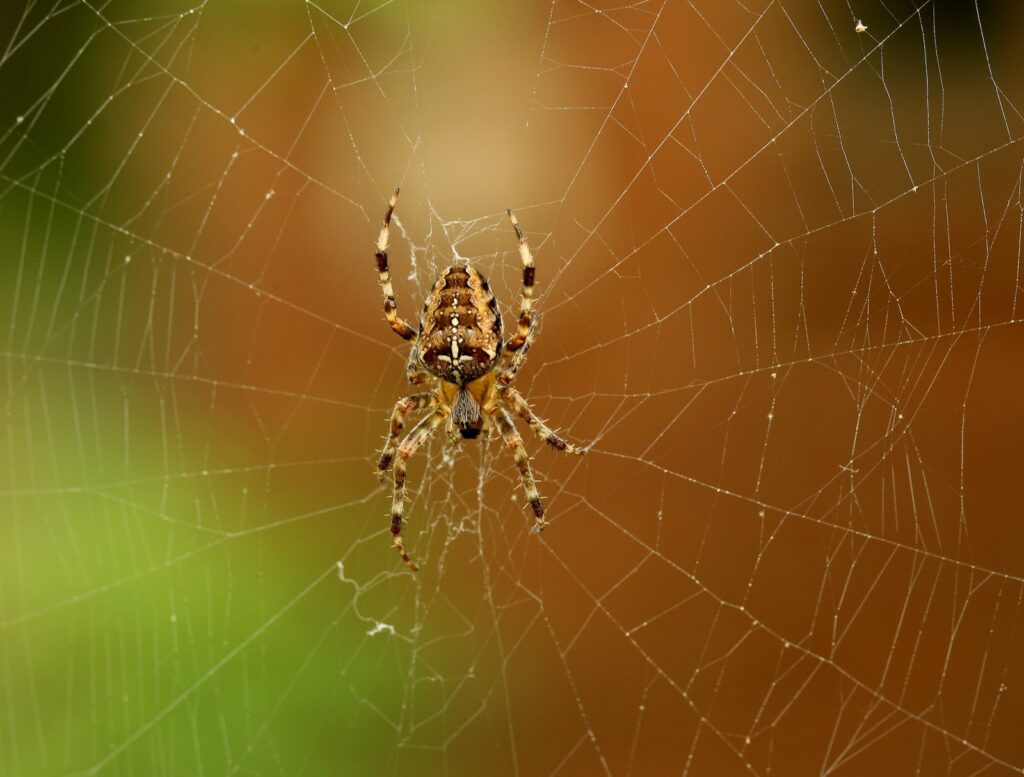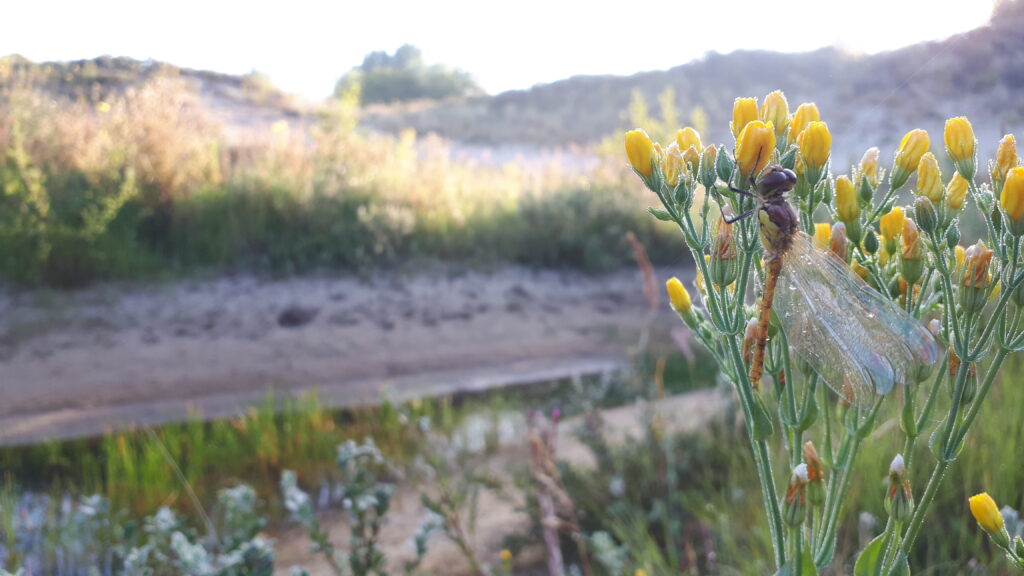
Research overview
We strive to unravel the eco-evolutionary mechanisms behind population dynamics, community assembly but also their important applications. We consider spatial interactions as a central process behind the structuring of biodiversity at different scales.
We are particularly interested in understanding how these interactions determine feedbacks among/between ecological and evolutionary processes. We focus on a diverse spectrum of symbiotic to antagonistic interactions and overall aim to understand how they impact the coexistence of species and strategies at local, regional and even global scales. We study how individual interactions affect the distributions and spread of species, how the emerging species interactions affect dispersal and therefore fluxes of genes, individuals and species. We have a particular interest in the evolution of dispersal, the distribution and community ecology of plants, arthropods, and their associated microbiomes. An important angle of our research is on understanding the eco-evolutionary dynamics of whole genome duplication and the translation of eco-evolutionary feedbacks into important applications.
We achieve these goals by integrating theoretical, correlative and experimental approaches, using a wide array of methodological techniques (from molecular techniques to remote sensing) by collaborating with partners from multiple national and international research institutes and universities. Our research, while fundamental by nature, contributes to further developments of nature-based solutions, nature management and species conservation.

Dispersal ecology & evolution
Understanding the mechanisms leading to variation in dispersal is of crucial importance to understand how changes in habitat- and resource distribution feedback on higher-level ecological processes and patterns. We use behavioural ecological and field-based approaches with arthropods as model systems to study the ecological and evolutionary drivers of movement and dispersal, and mesocosms approaches to infer its impact on patterns of ecological specialisation and range expansion.
We generate solid theory on the eco-evolutionary aspects of dispersal by means of individual based modelling. Current projects focus on the importance of costs and trade-offs on dispersal during range expansion and invasions, condition-dependent dispersal in food webs and the evolution of information use during dispersal.
Researchers involved: Femke Batsleer, Maxime Dahirel, Frederik Mortier, Thomas Parmentier, Garben Logghe

Eco-Evolutionary dynamics in space
With the introduction of the concept of metapopulations the awareness that spatial structure affects demographic and population dynamical processes steadily grew. Such a variation in spatial structure generates typical disequilibrium conditions which are mediated by population extinction and variable demographic dynamics. In contrast to single, unconnected populations, local selection pressures are expected to operate in concert with those acting at the metapopulation level. Given the fact that the vast majority of theory on life history evolution neglects extinction-recolonisation dynamics typical for metapopulations and the complex connection among traits, we combine experimental evolution with modeling to understand complex eco-evolutionary dynamics. We specifically focus on mite evolution in experimental metapopulations, urban evolution and the integration of ecology into our understanding of polyploid establishments and diversity (Methusalem project lead by Prof. Van de Peer) in spatially structured systems. We combine such research with field-based studies focussing on dispersal and llife history evolution dynamics in function of urbanisation, habitat fragmentation and range expansion. We tightly collaborate with the Wybouw-lab @TEREC.
Researchers involved: Karen Bisschop, Frederik Mortier, Silvija Milosavljević, Felipe Kauai Pereira

Community ecology & evolution
The way local communities and ecosystems react to environmental change depends on interaction between local and regional responses at all scales of biological organisation. The spatial configuration of populations and communities is as such an important environmental driver as it determines rates of movement and the strength of local and regional regulatory processes. The importance of inter- and intraspecific variation in arthropods traits for ecosystem functioning is studied in coastal dunes and urban environments. We rely on citizen science to collect global data on orb web spider traits (SpiderSpotter App) and develop theoretical models to understand the importance of body size and movement (evolution), foodweb and metacommunity functioning. Recent projects focus on the organisation of communities associated with single arthropod species: arthropod nest symbionts in ants and microbial associations in spider mites. The importance of plant genotypes and drought stress for associated arthropod communities, herbivory and eventually plant fitness is studied in the Biodiversa project PlantCline, using woodland strawberries as a model.
Researchers involved: Femke Batsleer, Karen Bisschop, Thomas Parmentier, Frederik Van Daele, Katrien De Wolf, Charlotte Taelman, Charlotte Van Driessche

Nature-based solution, ecological restoration and biological conservation
Anthropogenic disturbance and nature management have severe effects on the ecological and evolutionary mechanisms that eventually local diversity and ecosystem functioning. We use these insights to study the impact of urbanisation and climate change on plant-plant, plant-herbivore and plant-arthropod interactions using survey and experimental approaches. We further perform applied ecological research that aim to understand and predict the specific impact of connectivity restoration and nature management on the conservation and restoration of arthropod, plant, but also amphibians and freshwater fish diversity. Much conservation-oriented research is performed in close collaboration with INBO.
We have a specific expertise in coastal dune ecology and develop predictive models to assess the impact of climate change on coastal dune functioning and the development of dunes as nature based solutions. We coordinate in this respect an EU-horizon project on mainstreaming biodiversity in dune-dike hybrid NbS (DuneFront), and are partners in a VLAIO Blue Cluster project SUSANA to investigate whether alternative sediments can be used as a fundament for such dune-based NbS.
Researchers involved: Thomas Parmentier, Femke Batsleer, Maxime Dahirel, Frederik Van Daele, Ellen Blomme, Katrien De Wolf, Maaike Dhondt, Charlotte Taelman, Charlotte Van Driessche